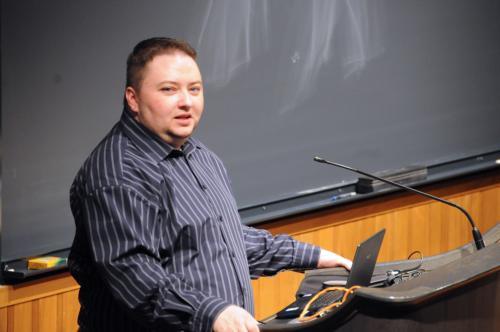
News
Summers Will Not Finish Semester of Teaching as Harvard Investigates Epstein Ties

News
Harvard College Students Report Favoring Divestment from Israel in HUA Survey

News
‘He Should Resign’: Harvard Undergrads Take Hard Line Against Summers Over Epstein Scandal

News
Harvard To Launch New Investigation Into Epstein’s Ties to Summers, Other University Affiliates

News
Harvard Students To Vote on Divestment From Israel in Inaugural HUA Election Survey
Speakers Advocate for Transgender Rights

Two activists argued for expanding hate crime laws at a panel in Sever Hall last night, stressing the current difficulties of navigating the U.S. legal system as a transgender person.
Gunner Scott, the director of the Massachusetts Transgender Political Coalition, said such obstacles made it critical to change existing hate crime and discrimination statutes to cover gender identity and expression.
Statewide legislation on the topic is currently pending in the Massachusetts joint judiciary committee, and local laws have already been adopted by Boston and Cambridge.
Scott and the coalition lobbied on behalf of the Boston anti-discrimination law before it was passed in Oct. 2002 and are now working on behalf of the passage of a statewide law.
“Trans people are the one minority that really have no discrimination coverage in this country,” said former Harvard Trans Task Force Chair Lisa J. Miracchi ’09, who organized the panel.
The event began with a comic titled “A few reasons why (we need a transgender rights bill),” which vividly portrayed the daily hardships faced by transgender individuals.
“I’m SO sorry, ‘Miss,’ but our last available apartment was JUST rented five minutes ago!” one speech bubble read.
M. Barusch ’06, the other presenter, reflected on her experiences as a member of the Massachusetts Trans Legal Advocates, a group of law students who advise transgender people for free.
Barusch is now a law student at Boston University, but as a Harvard undergraduate, she chaired the Bisexual, Gay, Lesbian, Transgender, and Supporters Alliance, now known as Harvard College Queer Students and Allies.
She enumerated a long list of legal issues for which transgender people need additional legal assistance.
Transgender people face legal dilemmas while transitioning from one gender to another, including changing their names and IDs to reflect their new gender, she said.
But Barusch emphasized that transgender people have a hard time navigating more common legal issues, including immigration, housing, and the prison system.
“A lot of these legal issues can be exacerbated by transphobia,” Barusch said.
For example, prisons are often gender-segregated, posing problems for transgender people who are incarcerated and often suffer from extreme harassment, she said.
Miracchi said she arranged the event to increase awareness for trans issues.
“Once you know people who face this everyday difficulty navigating the world, it touches you,” Miracchi said. “I couldn’t not try to do something about it.”
—Staff writer Danielle J. Kolin can be reached at dkolin@fas.harvard.edu.
Want to keep up with breaking news? Subscribe to our email newsletter.
